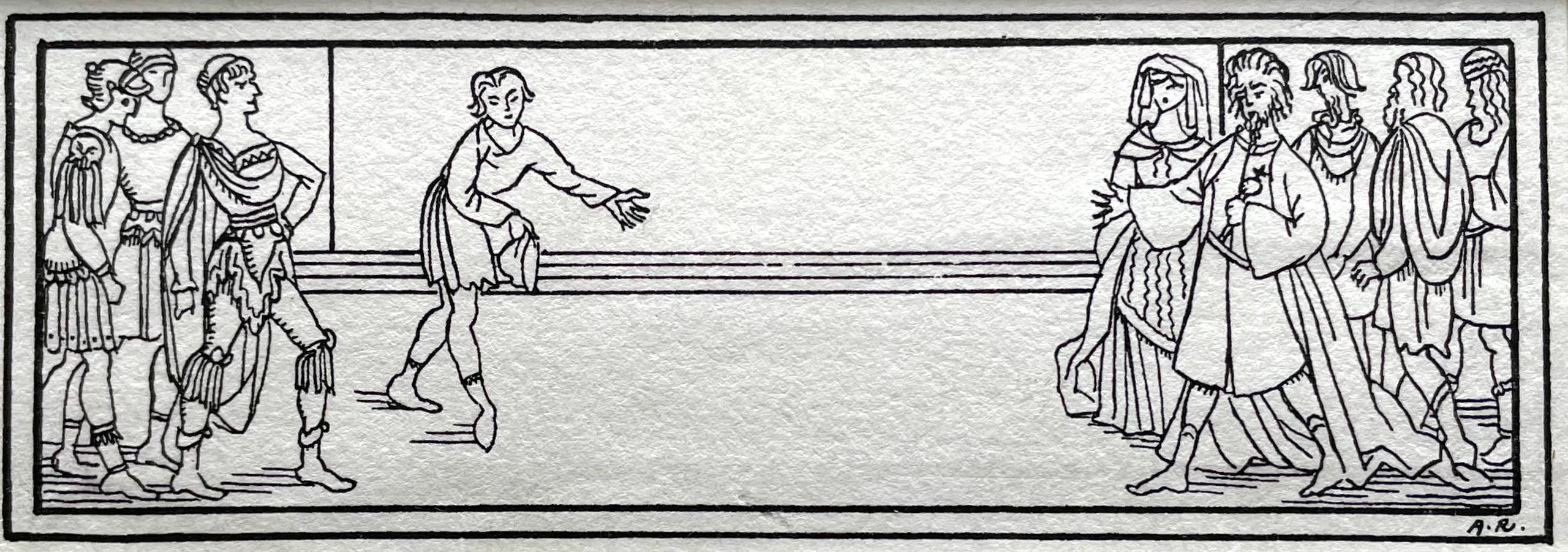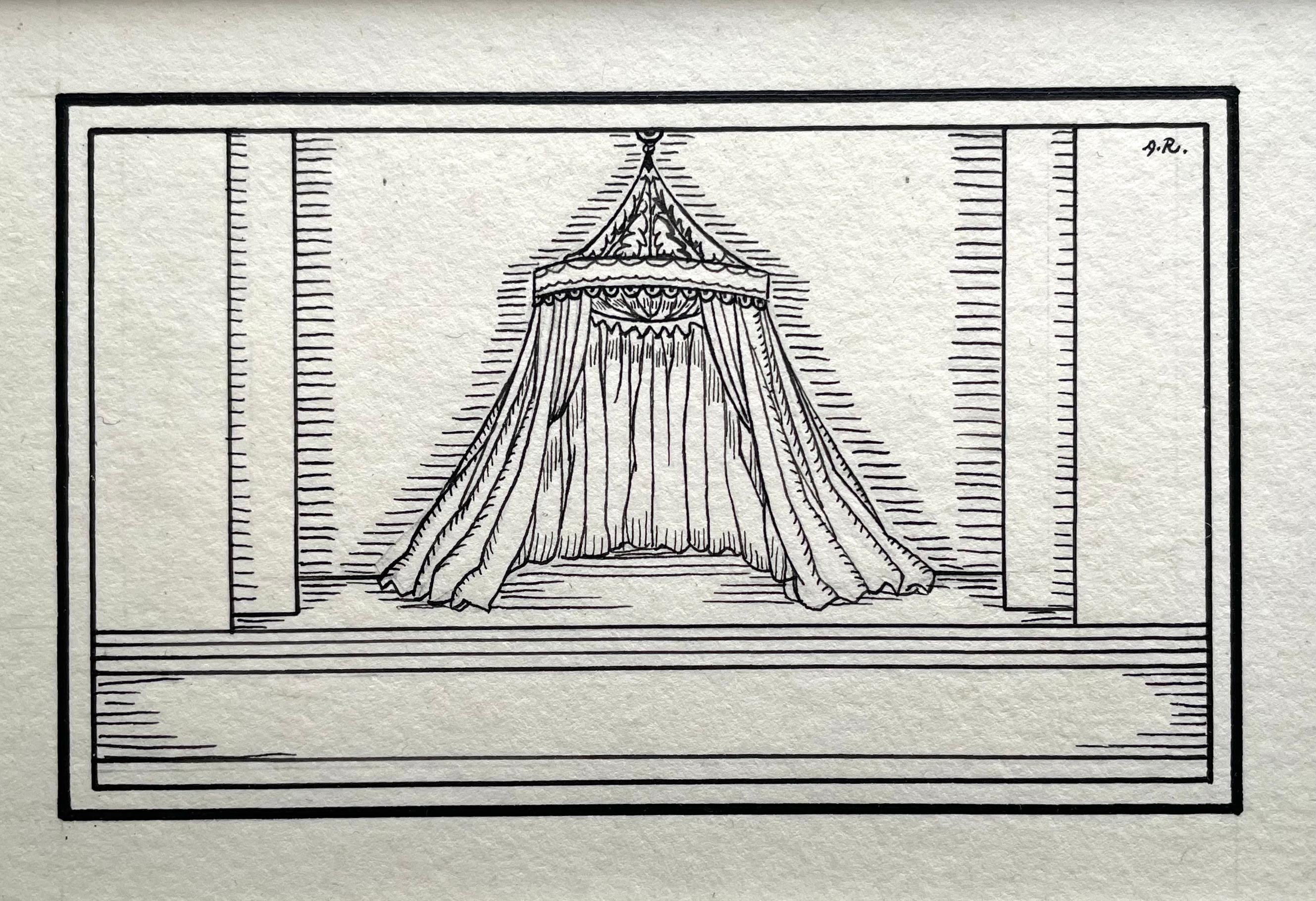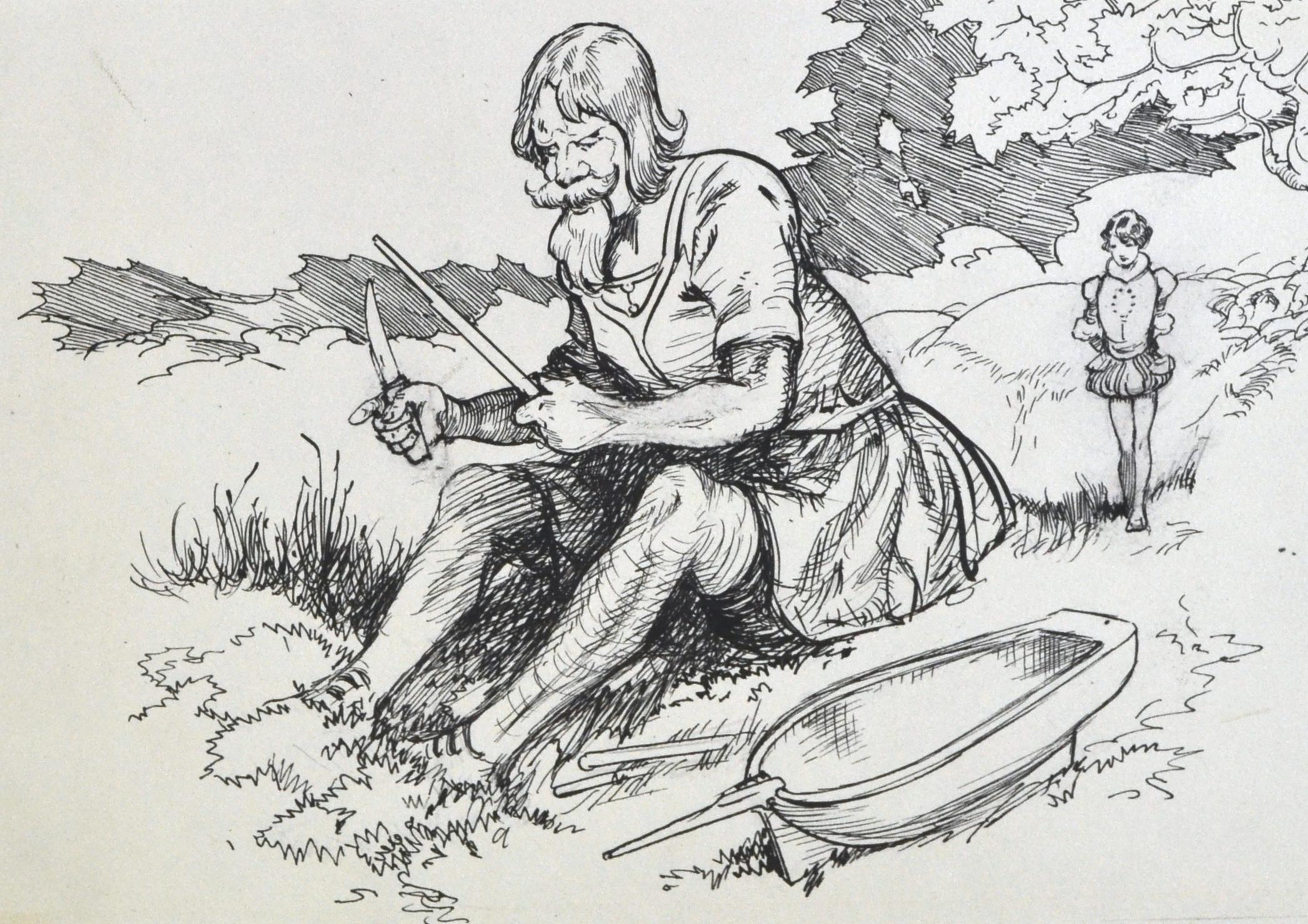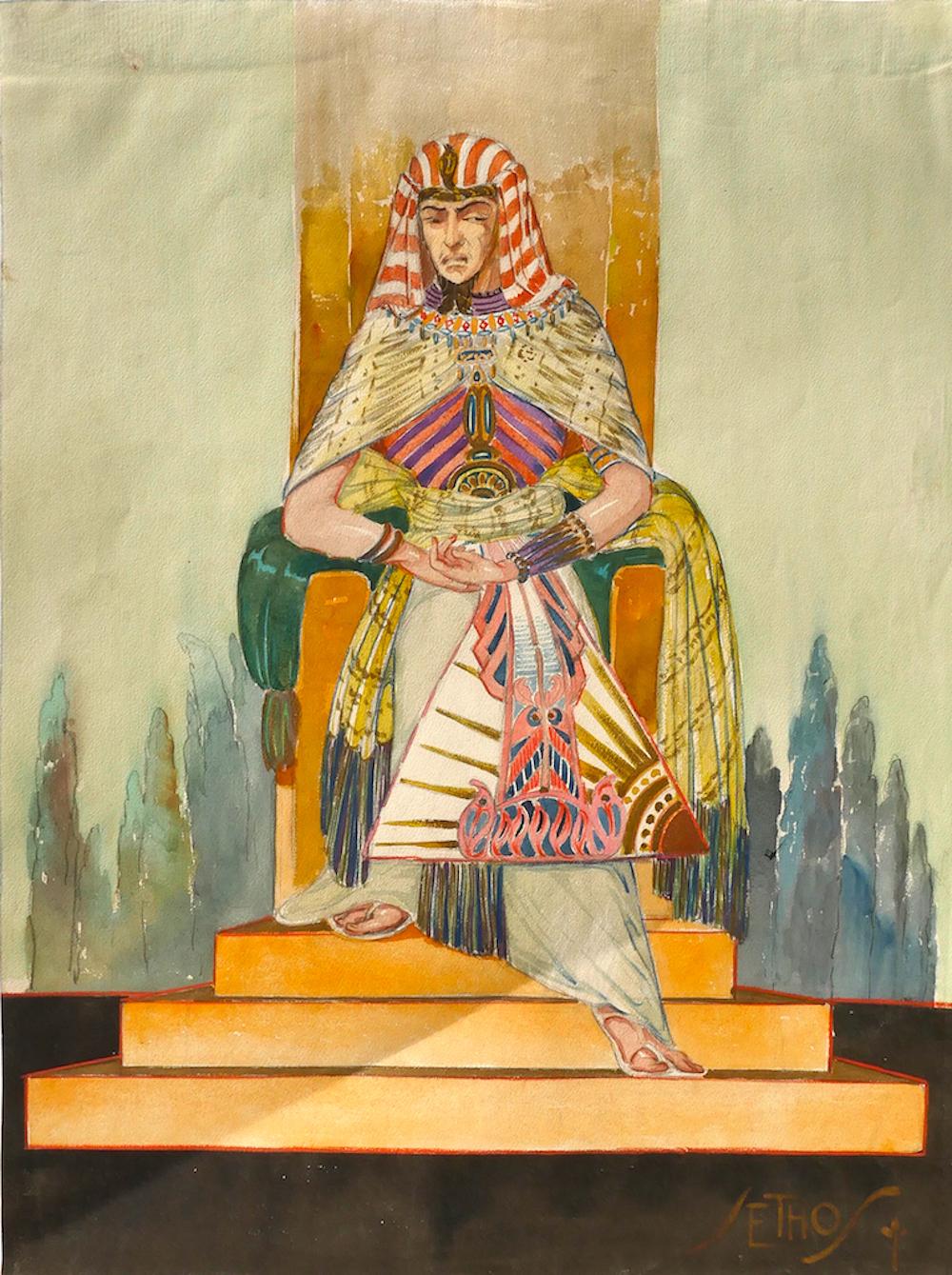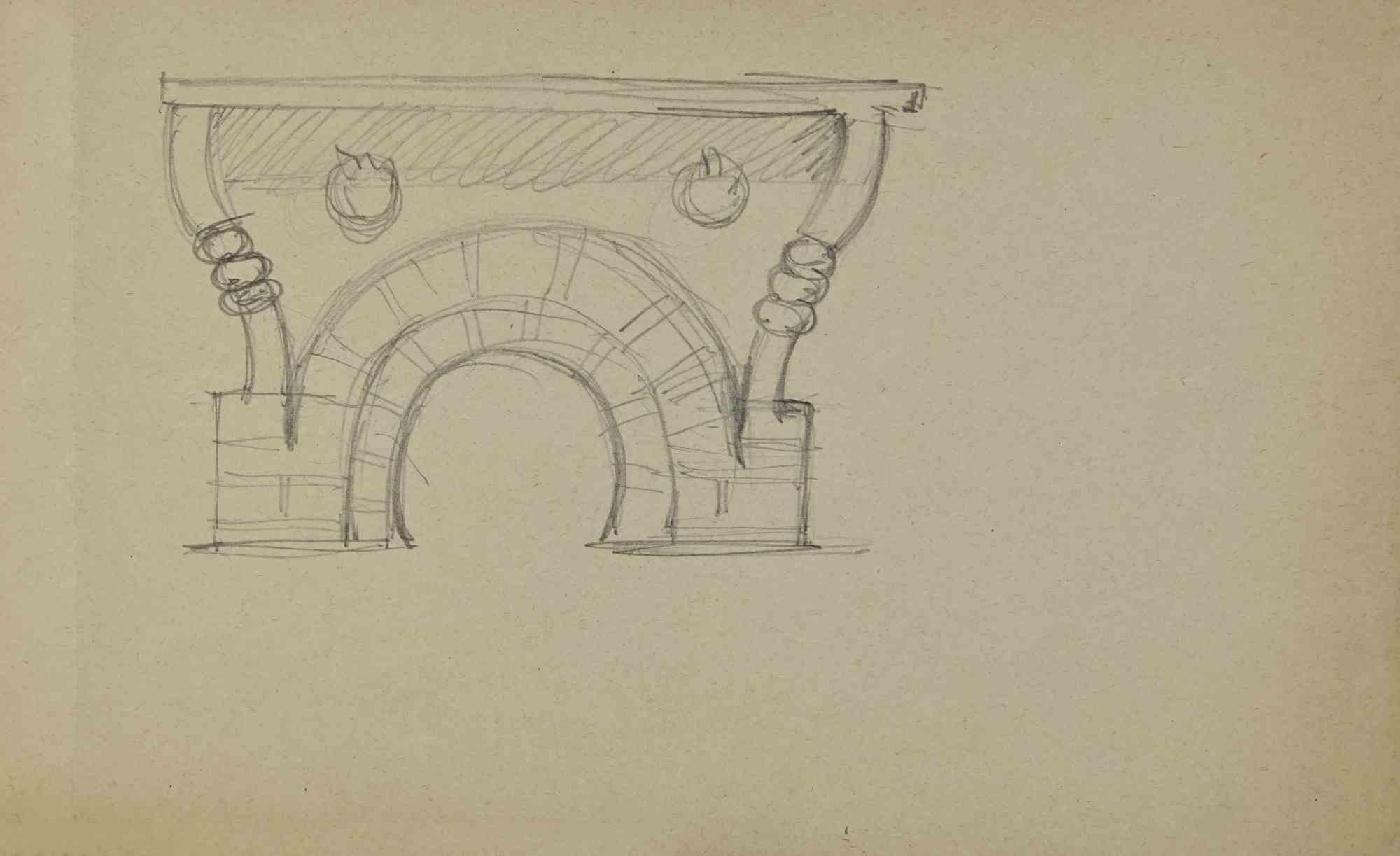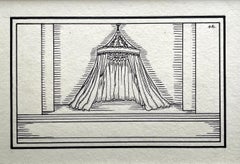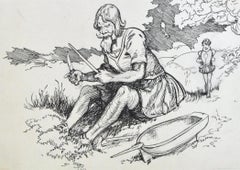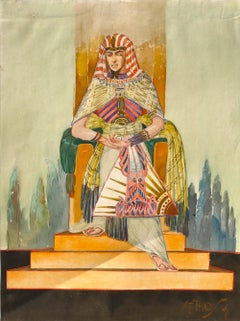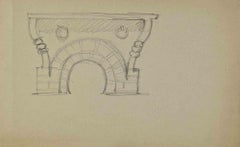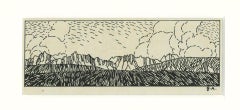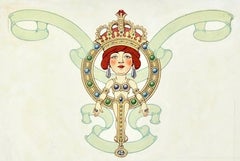Items Similar to Albert Rutherston - 1920s British Illustration for Cymberline
Want more images or videos?
Request additional images or videos from the seller
1 of 6
Albert Rutherston, RWSAlbert Rutherston - 1920s British Illustration for Cymberline
$343.08
£250
€293.95
CA$473.70
A$525.29
CHF 276
MX$6,418.20
NOK 3,453.17
SEK 3,241.39
DKK 2,194.38
About the Item
ALBERT RUTHERSTON, RWS
(1881-1953)
Tailpiece – Illustration for The Tragedie of Cymberline
Signed with initials l.r. AR; also signed with initials and inscribed beneath the mount: Tailpiece for end/of play {Cymberline}/No Reduction unless/”lay out”should make/necessary AR
Pen and ink
Unframed
6 by 10 cm., 2 ½ by 4 in.
(mount size 36.5 by 25.5 cm., 14 ½ by 10 in.)
Provenance:
Estate of the artist
Exhibited:
London, Sally Hunter Fine Art, Albert Rutherston, Drawings, Theatre Designs and other Treasures, 2016, no.66
The present work was illustrated in Cymbeline, published by Ernest Benn in 1923. The series was a collaboration between Rutherston and Harley Granville-Barker following on from their work together 11 years earlier at the Savoy Theatre and celebrating the quatercentenary of the Shakespeare Folio edition.
Born Albert Daniel Rothenstein, he was the youngest of the six children of Moritz and Bertha Rothenstein, German-Jewish immigrants who had settled in Bradford, Yorkshire in the 1860s. He and his siblings proved to be a hugely talented and artistic family, his elder brother became Sir William Rotherstein (1872-1945), the artist and director of the Royal College of Art; two of his other siblings, Charles Rutherston and Emily Hesslein, both accumulated major modern British and French art collections and his nephew Sir John Rothenstein was direct of the Tate Gallery.
He was educated at Bradford Grammar School before moving to London in 1898 to study at the Slade School of Art where he became close friends with Augustus John and William Orpen. He met Walter Sickert during a painting holiday in France in 1900 and by introducing Sickert to Spencer Gove became instrumental in the beginning of the Camden Town Group. He was one of Sickert’s most frequent companions and was one of the original members of the Fitzroy Street Group. Rutherston had a sociable and attractive personality, he frequently travelled abroad with other artists including Max Beerbohm, Spencer Gore, Walter Russell and Edna Clarke Hall. It was Clarke Hall who introduced him to watercolour paintin in 1910 while in Grasse on the France Riviera.
At the outbreak of World War I he was initially assigned a desk job with the Engineers’ War Service Register at the Board of Trade and from October 1916 he served with the Northamptonshire Regiment in Egypt and Palestine. At this time he anglicised his surname as a declaration of patriotism to the country of his birth. Following the war he returned to his artistic career and married the actress, Marjory Holman. He took a number of teaching posts, starting at Camberwell School of Art and later becoming Ruskin Master of Drawing in 1929. At the same time his own work flourished when he was recruited as an illustrator by the Curwen Press along with Claud Lovat Fraser and Paul Nash. In 1938 he largely returned to oil painting.
Rutherston became a member of the New English Art Club in 1905, a member of the Royal Society of Painters in Watercolours in 1942 and was also a regular exhibitor at the Cheltenham Group. Examples of his work are in the collections of the Tate Gallery, Victoria & Albert Museum Ashmolean Museum, Bradford Art Gallery Manchester City Art Gallery and elsewhere.
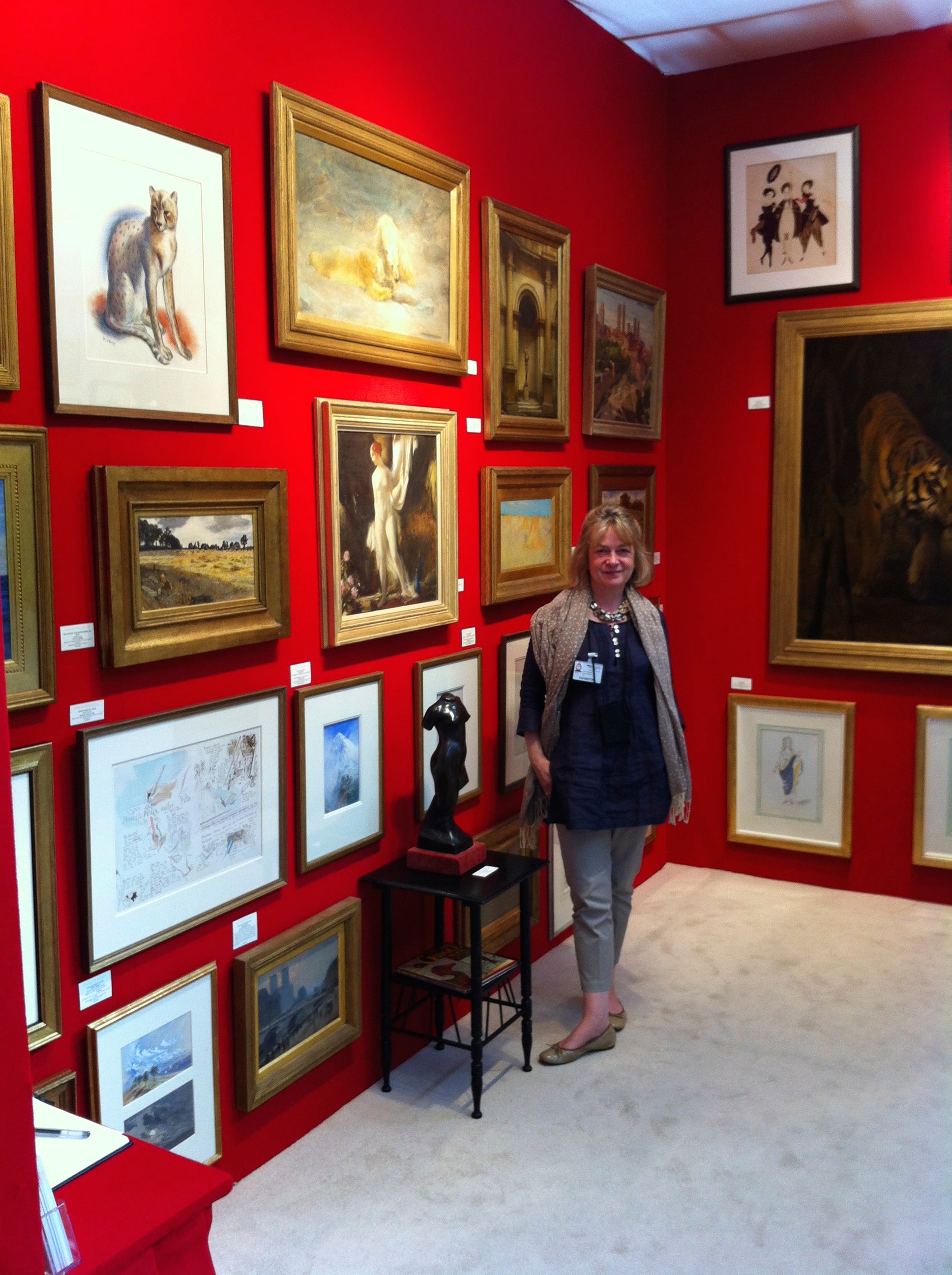
About the Seller
4.9
Vetted Professional Seller
Every seller passes strict standards for authenticity and reliability
Established in 2004
1stDibs seller since 2018
61 sales on 1stDibs
Typical response time: 2 hours
- ShippingRetrieving quote...Shipping from: Wigginton, United Kingdom
- Return Policy
Authenticity Guarantee
In the unlikely event there’s an issue with an item’s authenticity, contact us within 1 year for a full refund. DetailsMoney-Back Guarantee
If your item is not as described, is damaged in transit, or does not arrive, contact us within 7 days for a full refund. Details24-Hour Cancellation
You have a 24-hour grace period in which to reconsider your purchase, with no questions asked.Vetted Professional Sellers
Our world-class sellers must adhere to strict standards for service and quality, maintaining the integrity of our listings.Price-Match Guarantee
If you find that a seller listed the same item for a lower price elsewhere, we’ll match it.Trusted Global Delivery
Our best-in-class carrier network provides specialized shipping options worldwide, including custom delivery.More From This Seller
View AllAlbert Rutherston - British early 20th Century pen and ink illustration
Located in London, GB
ALBERT RUTHERSTON, RWS
(1881-1953)
The Meeting with Caius Lucius – Illustration for The Tragedie of Cymberline
Signed with initials l.r.
Pen and ink
Unframed
4.5 by 13 cm., 1 ¾ by 5 in.
(mount size 39.5 by 33 cm., 15 ½ by 13 in.)
Provenance:
Estate of the artist
Exhibited:
London, Sally Hunter Fine Art, Albert Rutherston, Drawings, Theatre Designs and other Treasures, 2016, no.65
The present work was illustrated in Cymbeline, published by Ernest Benn in 1923. The series was a collaboration between Rutherston and Harley Granville-Barker following on from their work together 11 years earlier at the Savoy Theatre and celebrating the quatercentenary of the Shakespeare Folio edition.
Born Albert Daniel Rothenstein, he was the youngest of the six children of Moritz and Bertha Rothenstein, German-Jewish immigrants who had settled in Bradford, Yorkshire in the 1860s. He and his siblings proved to be a hugely talented and artistic family, his elder brother became Sir William Rotherstein (1872-1945), the artist and director of the Royal College of Art; two of his other siblings, Charles Rutherston and Emily Hesslein, both accumulated major modern British and French art collections and his nephew Sir John Rothenstein was direct of the Tate Gallery.
He was educated at Bradford Grammar School before moving to London in 1898 to study at the Slade School of Art where he became close friends with Augustus John and William Orpen. He met Walter Sickert during a painting holiday in France in 1900 and by introducing Sickert to Spencer Gove became instrumental in the beginning of the Camden Town Group. He was one of Sickert’s most frequent companions and was one of the original members of the Fitzroy Street Group. Rutherston had a sociable and attractive personality, he frequently travelled abroad with other artists including Max Beerbohm, Spencer Gore, Walter Russell and Edna Clarke Hall...
Category
Early 20th Century Realist Figurative Drawings and Watercolors
Materials
Ink
Albert Rutherston - Tent - Pen and ink illustration for Cymbeline, British 1920s
Located in London, GB
ALBERT RUTHERSTON, RWS
(1881-1953)
Cymbeline’s Tent – Illustration for The Tragedie of Cymberline
Signed with initials u.r.: AR; also signed with initials and inscribed beneath the mount: Act V Sc V vide play No.2/Drawing X/not to be reduced AR
Pen and ink
Unframed
7 by 11.5 cm., 2 ¾ by 4 ½ in.
(mount size 39.5 by 33 cm., 15 ½ by 13 in.)
Provenance:
Estate of the artist
Exhibited:
London, Sally Hunter Fine Art, Albert Rutherston, Drawings, Theatre Designs and other Treasures, 2016, no.64
The present work was illustrated in Cymbeline, published by Ernest Benn in 1923. The series was a collaboration between Rutherston and Harley Granville-Barker following on from their work together 11 years earlier at the Savoy Theatre and celebrating the quatercentenary of the Shakespeare Folio edition.
Born Albert Daniel Rothenstein, he was the youngest of the six children of Moritz and Bertha Rothenstein, German-Jewish immigrants who had settled in Bradford, Yorkshire in the 1860s. He and his siblings proved to be a hugely talented and artistic family, his elder brother became Sir William Rotherstein (1872-1945), the artist and director of the Royal College of Art; two of his other siblings, Charles Rutherston and Emily Hesslein, both accumulated major modern British and French art collections and his nephew Sir John Rothenstein was direct of the Tate Gallery.
He was educated at Bradford Grammar School before moving to London in 1898 to study at the Slade School of Art where he became close friends with Augustus John and William Orpen. He met Walter Sickert during a painting holiday in France in 1900 and by introducing Sickert to Spencer Gove became instrumental in the beginning of the Camden Town Group. He was one of Sickert’s most frequent companions and was one of the original members of the Fitzroy Street Group. Rutherston had a sociable and attractive personality, he frequently travelled abroad with other artists including Max Beerbohm, Spencer Gore, Walter Russell and Edna Clarke Hall...
Category
1920s Realist Landscape Drawings and Watercolors
Materials
Ink
Original 1920s British Pen and ink Children's book Illustration by Frank Watkins
By Frank Watkins
Located in London, GB
FRANK WATKINS
(1863-1929)
The Boat Builder Giant
Pen and ink, unframed, in conservation mount only
20.5 by 29.5 cm., 8 by 11 ¾ in.
(frame size 36.5 by 45 cm., 14 ½ by 17 ¾ in.)
Frank Henry Watkins was born in Lambeth, London and was the son of a bank clerk. He worked as a children’s book and comic illustrator in the early 20th century, drawing for many children’s stories including Dolly Twoshoes (1901); The Wonder and Dolly Daydream (1902); Illustrated Chips and Dick and Daisy (1919-1921) and also for Merry Moments. He provided book illustrations for The Man From the Moon by Philip Carmichael (1909); The Sun’s Babies by Edith Howes (1910); The King Who Never Died: Tales of King Arthur by Dorothy Senior (1910) and Fairy Rings...
Category
1920s Realist Figurative Drawings and Watercolors
Materials
Ink
Gilbert Ledward - 1930s Watercolour Design for a Decorative Sculptural Frieze
Located in London, GB
GILBERT LEDWARD, RA, PRBS
(1888-1960)
Tennis, Golf, Shooting, Ice-Skating, Dreaming – Proposed Design for Decorative Frieze in the Italian Drawing Room at Eltham Palace, commissioned by Stephen Courtauld
Signed and dated July 9th 1933
Watercolour and pencil
12.5 by 49.5 cm., 5 by 19 ½ in.
(frame size 36 by 67 cm., 14 ¼ by 26 ¼ in.)
Exhibited:
The artist’s daughter;
London, The Fine Art Society, A Centenary Tribute, Feb 1988, no. 43.
Gilbert Ledward was born in London. He was educated at St Mark’s College, Chelsea. In 1905 he entered the Royal College of Art to study sculpture under Edouard Lanteri and in 1910 he entered the Royal Academy Schools. In 1913 he won the Prix de Rome for sculpture, the Royal Academy’s travelling award and gold medal, which allowed him to travel in Italy until the outbreak of the Wold War I. During the war he served as a lieutenant in the Royal Garrison Artillery and was appointed as an official war artist in 1918.
Following the war he was largely occupied as a sculptor of war memorials including the Guards Division memorial in St James’s Park and the Household Division’s memorial in Horse Guards Parade. In 1934, supported by Eric Gill and Edwin Lutyens, he established a company called Sculptured Memorials and Headstones, which promoted better design of memorials in English churchyards. His war memorials after World War II include one in Westminster Abbey to the Submarine Service, Commandos and Airborne Forces.
Ledward was Professor of Sculpture at the Royal College of Art (1927-1929) and in 1937 was elected at Royal Academician. He became President of the Royal Society of British Sculptors and a trustee of the Royal Academy.
The present work is a design for an intended decorative frieze for the Italian Drawing Room of Eltham Palace. In 1935 the remains of the medieval royal palace of Eltham was rescued from decay by Stephen and Virginia Courtald who built an ultra modern Art Deco house to adjoin the existing Great Hall. They employed the architects John Seeley and Paul Edward Paget and the fashionable Mayfair interior designer the Marchese Peter Malacrida to design the strikingly glamorous 1930s interiors of the new house. The dramatic entrance hall was created by the Swedish designer Rolf Engstromer...
Category
1930s Art Deco Figurative Sculptures
Materials
Watercolor
Plenty - 1930s British Art Deco design for a Mural by Harry Carleton Attwood
Located in London, GB
HARRY CARLETON ATTWOOD
(1907-1985)
Plenty - Design for Eltham Palace
Chalks
Framed
20.5 by 12 cm., 8 by 4 ¾ in.
(frame size 39.5 by 31.5 cm., 15 ½ by 12 ½ in.)
Attwood was born i...
Category
1930s Art Deco Figurative Drawings and Watercolors
Materials
Chalk
The Travellers - 1920s British Children's book illustration by Frank Watkins
By Frank Watkins
Located in London, GB
FRANK WATKINS (1863-1929)
The Travellers
Signed
Pen and ink, unframed, in conservation mount only
17.5 by 26 cm., 7 by 10 ¼ in.
(frame size 33.5 by 41 cm., 13 ¼ by 16 in.)
Frank Henry Watkins was born in Lambeth, London and was the son of a bank clerk. He worked as a children’s book and comic illustrator in the early 20th century, drawing for many children’s stories including Dolly Twoshoes (1901); The Wonder and Dolly Daydream (1902); Illustrated Chips and Dick and Daisy (1919-1921) and also for Merry Moments. He provided book illustrations for The Man From the Moon by Philip Carmichael (1909); The Sun’s Babies by Edith Howes (1910); The King Who Never Died: Tales of King Arthur by Dorothy Senior (1910) and Fairy Rings...
Category
1920s Realist Figurative Drawings and Watercolors
Materials
Ink
You May Also Like
Setho - Watercolor by Unknown Master - 1920s
Located in Roma, IT
The king is an original drawing in watercolor on cardboard realized by Toha in 1924 ca.
The state of preservation of the artwork is good except for small decoloration and folding on...
Category
1920s Figurative Drawings and Watercolors
Materials
Ink, Watercolor
Sketch - Drawing by Joseph Alexander Colin - Mid-20th Century
Located in Roma, IT
Sketch is a drawing realized by Joseph Colin in the Mid-20th Century.
Pencil on ivory-colored paper
Good conditions with slight foxing.
The artwork is realized through deft expres...
Category
Mid-20th Century Modern Figurative Drawings and Watercolors
Materials
Pencil, Paper
Illustration - Drawing In Pen by Bruno Angoletta - Early 20th Century
By Bruno Angoletta
Located in Roma, IT
Illustration is an original drawing in pen realized by Italian artist Bruno Angoletta.
Hand-signed at the top right "Ag" in pencil.
Included a Passepartout: 30 x 40 cm.
Good con...
Category
Early 20th Century Modern Figurative Drawings and Watercolors
Materials
Pen
"More Precious than Rubies, " Story Illustration for Saturday Evening Post, 1924
By Guernsey Moore
Located in Fort Washington, PA
Signature: Unsigned
"More Precious than Rubies," by Katherine Sproehnle and Jane Grant, illustrated by Guernsey Moore for the Saturday Evening Post, June 7, 1924.
Category
1920s Figurative Drawings and Watercolors
Materials
Paint
The Sketch - Original Drawing - Mid 20th Century
Located in Roma, IT
Sketches is an Original Carbon Pencil Drawing realized by an Unknown artist of mid-20th century.
The Drawing is in good condition on a yellowed cardboard.
No signature.
Others ske...
Category
Mid-20th Century Modern Figurative Drawings and Watercolors
Materials
Pencil
Trachino - Watercolor by Unknown Master - 1920s
Located in Roma, IT
Trachino is an original drawing in watercolor on cardboard realized by Toha in 1923 ca., as scenography for the representation of Heliodorus of Emesa's "The Ethiopians".
The state o...
Category
1920s Figurative Drawings and Watercolors
Materials
Ink, Watercolor
